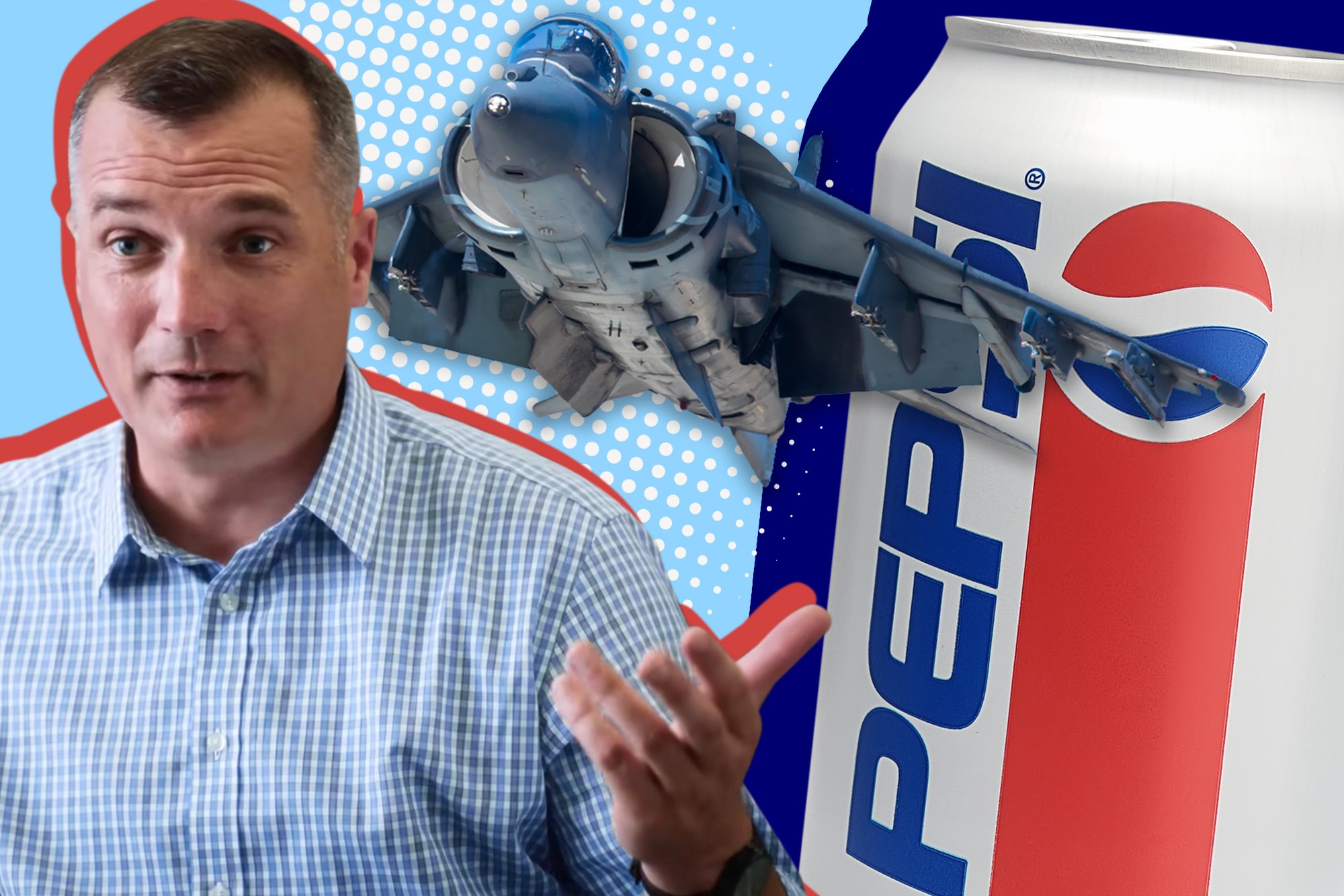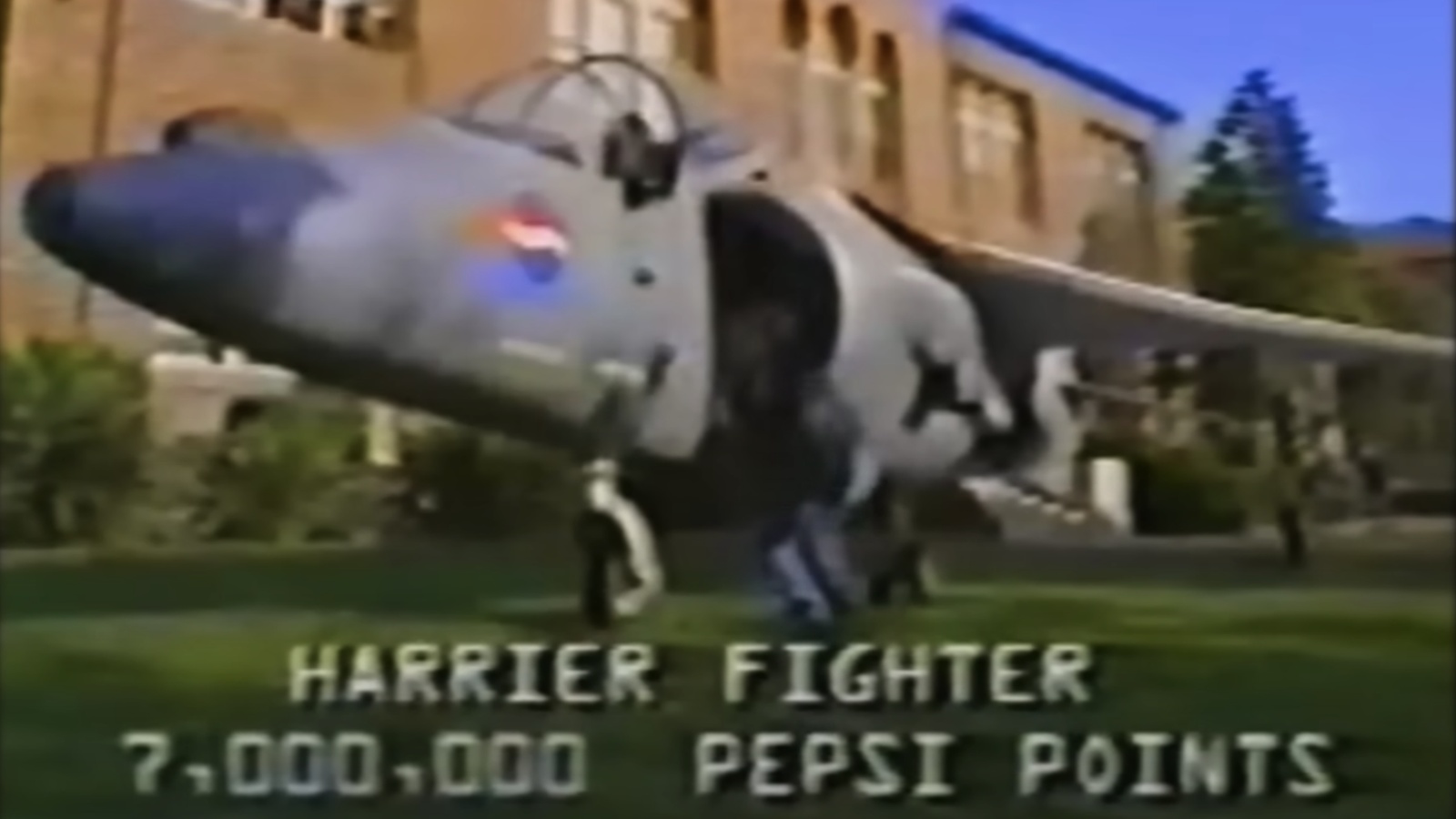The "Pepsi Jet Lawsuit" refers to a legal dispute that arose in 1996 when PepsiCo, the beverage company, ran a promotional campaign offering consumers the chance to win a Harrier fighter jet. The promotion was based on a commercial that featured a teenager using Pepsi points to purchase a Harrier jet. However, when several consumers attempted to redeem their points for the jet, PepsiCo refused to honor the offer, claiming that it was a joke. This led to a class-action lawsuit against PepsiCo, alleging deceptive advertising and breach of contract.
The lawsuit gained significant public attention and media coverage. It raised questions about the ethics of advertising and the responsibility of companies to honor their promotions. The case was eventually settled out of court, with PepsiCo agreeing to pay $750,000 to the plaintiffs and to offer alternative prizes to those who had attempted to redeem their points for the jet.
The "Pepsi Jet Lawsuit" is an important example of the legal issues that can arise from misleading advertising. It also highlights the importance of clear and accurate communication in marketing and advertising campaigns.
Pepsi Jet Lawsuit
The "Pepsi Jet Lawsuit" is a significant legal case that highlights the importance of clear and accurate advertising. Here are eight key aspects of the case:
- Misleading advertising: PepsiCo's commercial featuring a teenager using Pepsi points to purchase a Harrier jet was misleading.
- Breach of contract: PepsiCo refused to honor the offer of a Harrier jet, which constituted a breach of contract.
- Class-action lawsuit: The lawsuit was filed as a class-action, meaning that it represented a large group of consumers who had been misled by PepsiCo's advertising.
- Settlement: The case was eventually settled out of court, with PepsiCo agreeing to pay $750,000 to the plaintiffs and to offer alternative prizes to those who had attempted to redeem their points for the jet.
- Public attention: The lawsuit gained significant public attention and media coverage.
- Legal precedent: The case set an important legal precedent for misleading advertising.
- Ethical issues: The case raised questions about the ethics of advertising and the responsibility of companies to honor their promotions.
- Consumer protection: The case highlights the importance of consumer protection laws and the role of the courts in protecting consumers from misleading advertising.
The "Pepsi Jet Lawsuit" is a reminder that companies must be careful not to mislead consumers with their advertising. It also highlights the importance of clear and accurate communication in marketing and advertising campaigns.
Misleading advertising
The "Pepsi Jet Lawsuit" is a prime example of the legal consequences that can arise from misleading advertising. PepsiCo's commercial, which featured a teenager using Pepsi points to purchase a Harrier jet, was clearly misleading. Consumers who saw the commercial were led to believe that they could actually win a Harrier jet by collecting Pepsi points. However, when several consumers attempted to redeem their points for the jet, PepsiCo refused to honor the offer, claiming that it was a joke.
The "Pepsi Jet Lawsuit" highlights the importance of clear and accurate advertising. Companies must be careful not to mislead consumers with their advertising claims. If a company makes a promise to consumers, it must be prepared to honor that promise. Otherwise, the company may face legal consequences, as PepsiCo did in the "Pepsi Jet Lawsuit."
The "Pepsi Jet Lawsuit" also serves as a reminder to consumers to be skeptical of advertising claims. Consumers should not assume that everything they see in an advertisement is true. They should read the fine print and do their research before making a purchase.
Breach of contract
The "Pepsi Jet Lawsuit" is a significant legal case that highlights the importance of honoring contracts. In this case, PepsiCo made an offer to consumers to win a Harrier jet by collecting Pepsi points. However, when several consumers attempted to redeem their points for the jet, PepsiCo refused to honor the offer, claiming that it was a joke.
PepsiCo's refusal to honor the offer constituted a breach of contract. A contract is a legally binding agreement between two or more parties. When one party to a contract fails to fulfill their obligations, they are said to be in breach of contract. In this case, PepsiCo's failure to honor the offer of the Harrier jet was a breach of contract.
The "Pepsi Jet Lawsuit" is a reminder that companies must honor their contracts. If a company makes a promise to consumers, it must be prepared to keep that promise. Otherwise, the company may face legal consequences, as PepsiCo did in the "Pepsi Jet Lawsuit."
Class-action lawsuit
The "Pepsi Jet Lawsuit" is a significant legal case that highlights the importance of class-action lawsuits. A class-action lawsuit is a lawsuit that is filed on behalf of a large group of people who have been harmed by the same defendant. In the case of the "Pepsi Jet Lawsuit," the plaintiffs were a group of consumers who had been misled by PepsiCo's advertising.
The "Pepsi Jet Lawsuit" would not have been possible without the class-action lawsuit mechanism. Individual consumers who had been misled by PepsiCo's advertising would have been unable to afford to file a lawsuit on their own. However, by filing a class-action lawsuit, the plaintiffs were able to pool their resources and hire an attorney to represent them.Class-action lawsuits are an important tool for protecting consumers from corporate wrongdoing. They allow consumers to hold companies accountable for their actions, even if they do not have the resources to file a lawsuit on their own.
The "Pepsi Jet Lawsuit" is a reminder that companies must be careful not to mislead consumers with their advertising. If a company does mislead consumers, it may be held liable for damages. Class-action lawsuits are an important tool for protecting consumers from corporate wrongdoing.
Settlement
The settlement of the "Pepsi Jet Lawsuit" is a significant event in the case. It represents a victory for the plaintiffs, who were able to hold PepsiCo accountable for its misleading advertising. The settlement also sends a message to other companies that they must be careful not to mislead consumers with their advertising claims.
The settlement is also important because it provides some compensation to the plaintiffs for the harm that they suffered as a result of PepsiCo's misleading advertising. The plaintiffs were each awarded $1,000, and they were also given the opportunity to exchange their Pepsi points for other prizes.
The settlement of the "Pepsi Jet Lawsuit" is a reminder that companies must be careful not to mislead consumers with their advertising. If a company does mislead consumers, it may be held liable for damages. Class-action lawsuits are an important tool for protecting consumers from corporate wrongdoing.
Public attention
The "Pepsi Jet Lawsuit" gained significant public attention and media coverage. This was due to several factors, including the high-profile nature of the case, the involvement of a major corporation, and the humorous nature of the lawsuit itself.
The public attention and media coverage of the "Pepsi Jet Lawsuit" had several important consequences. First, it helped to raise awareness of the issue of misleading advertising. Second, it put pressure on PepsiCo to settle the lawsuit and to change its advertising practices. Third, it sent a message to other companies that they must be careful not to mislead consumers with their advertising claims.
The "Pepsi Jet Lawsuit" is a reminder that public attention and media coverage can be a powerful force for change. When consumers are made aware of corporate wrongdoing, they can put pressure on companies to change their behavior. Public attention and media coverage can also help to raise awareness of important issues and to hold corporations accountable for their actions.
Legal precedent
The "Pepsi Jet Lawsuit" is a landmark case in the area of misleading advertising. The case established several important legal precedents that have shaped the way that courts handle misleading advertising cases.
- Established a clear standard for misleading advertising. Prior to the "Pepsi Jet Lawsuit," there was no clear legal standard for determining what constituted misleading advertising. The "Pepsi Jet Lawsuit" established a clear standard that courts can use to determine whether an advertisement is misleading.
- Held advertisers liable for the reasonable interpretation of their advertisements. The "Pepsi Jet Lawsuit" held that advertisers are liable for the reasonable interpretation of their advertisements, even if they did not intend to mislead consumers. This means that advertisers cannot use disclaimers or fine print to avoid liability for misleading advertising.
- Allowed consumers to sue for damages caused by misleading advertising. The "Pepsi Jet Lawsuit" allowed consumers to sue for damages caused by misleading advertising. This means that consumers can now hold advertisers accountable for the harm that their misleading advertising causes.
The "Pepsi Jet Lawsuit" has had a significant impact on the law of misleading advertising. The case has established important legal precedents that have made it easier for consumers to hold advertisers accountable for their misleading advertising.
Ethical issues
The "Pepsi Jet Lawsuit" raised important ethical issues about the ethics of advertising and the responsibility of companies to honor their promotions. PepsiCo's advertising campaign for the Harrier jet was misleading, and the company's refusal to honor the offer was a breach of contract. The case highlights the importance of ethical behavior in advertising and the need for companies to be transparent and honest in their dealings with consumers.
The "Pepsi Jet Lawsuit" also raised questions about the responsibility of companies to honor their promotions. PepsiCo's refusal to honor the offer of the Harrier jet damaged the company's reputation and led to a loss of consumer trust. The case serves as a reminder that companies must be careful not to make promises that they cannot keep.
The "Pepsi Jet Lawsuit" is a landmark case that has had a significant impact on the law of advertising and marketing. The case has established important legal precedents that have made it easier for consumers to hold advertisers accountable for their misleading advertising. The case has also raised important ethical issues about the responsibility of companies to honor their promotions.
Consumer protection
The "Pepsi Jet Lawsuit" is a landmark case in the area of consumer protection. The case highlights the importance of consumer protection laws and the role of the courts in protecting consumers from misleading advertising.
Prior to the "Pepsi Jet Lawsuit," there was no clear legal standard for determining what constituted misleading advertising. The "Pepsi Jet Lawsuit" established a clear standard that courts can use to determine whether an advertisement is misleading. The case also held that advertisers are liable for the reasonable interpretation of their advertisements, even if they did not intend to mislead consumers. This means that advertisers cannot use disclaimers or fine print to avoid liability for misleading advertising.
The "Pepsi Jet Lawsuit" also allowed consumers to sue for damages caused by misleading advertising. This means that consumers can now hold advertisers accountable for the harm that their misleading advertising causes.
The "Pepsi Jet Lawsuit" has had a significant impact on the law of consumer protection. The case has established important legal precedents that have made it easier for consumers to hold advertisers accountable for their misleading advertising.
The "Pepsi Jet Lawsuit" is a reminder that companies must be careful not to mislead consumers with their advertising. The case also highlights the importance of consumer protection laws and the role of the courts in protecting consumers from misleading advertising.
Pepsi Jet Lawsuit
The "Pepsi Jet Lawsuit" is a landmark case in the area of consumer protection. The case highlights the importance of consumer protection laws and the role of the courts in protecting consumers from misleading advertising.
Question 1: What is the "Pepsi Jet Lawsuit"?
Answer: The "Pepsi Jet Lawsuit" was a class-action lawsuit filed against PepsiCo in 1996. The lawsuit alleged that PepsiCo misled consumers with an advertising campaign that featured a teenager using Pepsi points to purchase a Harrier jet. PepsiCo refused to honor the offer, claiming that it was a joke.
Question 2: What was the outcome of the "Pepsi Jet Lawsuit"?
Answer: The case was settled out of court, with PepsiCo agreeing to pay $750,000 to the plaintiffs and to offer alternative prizes to those who had attempted to redeem their points for the jet.
Question 3: What is the legal significance of the "Pepsi Jet Lawsuit"?
Answer: The "Pepsi Jet Lawsuit" established several important legal precedents that have made it easier for consumers to hold advertisers accountable for their misleading advertising.
Question 4: What are the ethical issues raised by the "Pepsi Jet Lawsuit"?
Answer: The "Pepsi Jet Lawsuit" raised important ethical issues about the ethics of advertising and the responsibility of companies to honor their promotions.
Question 5: What are the consumer protection implications of the "Pepsi Jet Lawsuit"?
Answer: The "Pepsi Jet Lawsuit" highlights the importance of consumer protection laws and the role of the courts in protecting consumers from misleading advertising.
Question 6: What are the key takeaways from the "Pepsi Jet Lawsuit"?
Answer: The "Pepsi Jet Lawsuit" is a reminder that companies must be careful not to mislead consumers with their advertising. The case also highlights the importance of consumer protection laws and the role of the courts in protecting consumers from misleading advertising.
The "Pepsi Jet Lawsuit" is a landmark case that has had a significant impact on the law of consumer protection. The case has established important legal precedents that have made it easier for consumers to hold advertisers accountable for their misleading advertising.
Transition to the next article section...
Tips Regarding the "Pepsi Jet Lawsuit"
The "Pepsi Jet Lawsuit" is a landmark case in consumer protection law. It highlights the importance of clear and accurate advertising, the responsibility of companies to honor their promotions, and the role of the courts in protecting consumers from misleading advertising.
Tip 1: Be careful not to mislead consumers with your advertising. Make sure that your advertising claims are accurate and truthful, and that they are not likely to mislead consumers.
Tip 2: Honor your promotions. If you make a promise to consumers, be prepared to keep that promise. If you do not honor your promotions, you may face legal consequences.
Tip 3: Be aware of the legal standards for misleading advertising. The "Pepsi Jet Lawsuit" established a clear legal standard for misleading advertising. Make sure that your advertising complies with this standard.
Tip 4: Be transparent and honest in your dealings with consumers. Consumers are more likely to trust companies that are transparent and honest. Avoid using disclaimers or fine print to avoid liability for misleading advertising.
Tip 5: Be prepared to defend your advertising claims if they are challenged. If you are sued for misleading advertising, be prepared to defend your advertising claims in court. You may need to provide evidence to support your claims.
By following these tips, you can help to avoid the legal pitfalls associated with misleading advertising.
Summary of key takeaways:
- Be careful not to mislead consumers with your advertising.
- Honor your promotions.
- Be aware of the legal standards for misleading advertising.
- Be transparent and honest in your dealings with consumers.
- Be prepared to defend your advertising claims if they are challenged.
By following these tips, you can help to protect your company from legal liability and maintain a positive reputation with consumers.
...
Conclusion
The "Pepsi Jet Lawsuit" is a landmark case in consumer protection law. The case highlights the importance of clear and accurate advertising, the responsibility of companies to honor their promotions, and the role of the courts in protecting consumers from misleading advertising.
The key takeaways from the "Pepsi Jet Lawsuit" are as follows:
- Companies must be careful not to mislead consumers with their advertising.
- Companies must honor their promotions.
- Companies must be aware of the legal standards for misleading advertising.
- Companies must be transparent and honest in their dealings with consumers.
- Companies must be prepared to defend their advertising claims if they are challenged.
Unveiling The Truth: John Leonard Vs Pepsi And Its Impact On Advertising And Consumer Rights
Uncover The Extraordinary World Of Coco Martin: An Actor's Journey Of Versatility And Impact
Unveiling The Genius: Jim Simons' Educational Journey To Success

When a Man Took a Joke in a Pepsi Ad Seriously, Chaos Ensued ‹ Literary Hub

fat amy jet

Em 1996, a Pepsi ‘brincou’ sobre dar um caça a jato por pontos Pepsi
ncG1vNJzZmianKS0pr7SZ5mlp5JjsLC%2BxGeuoqaUpMS0es2eq2iqkaKyr3vPnqesoV2fsrV5y5qurK2ZqXupwMyl